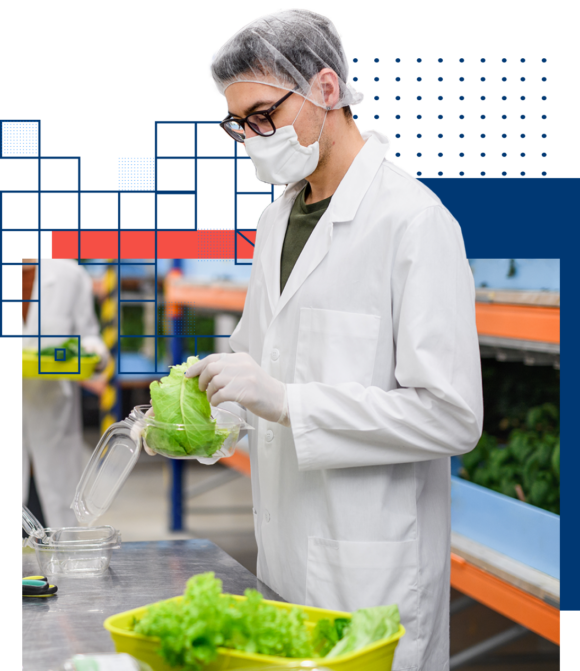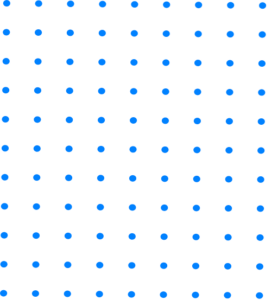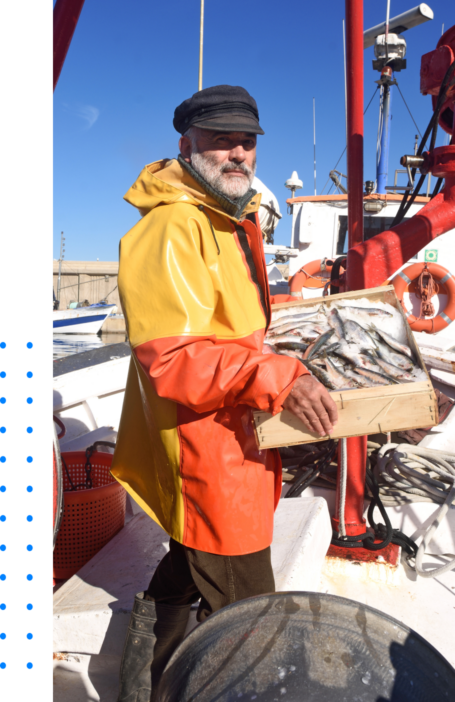Food safety made easy.
Protect public health — and your company — with Registrar Corp’s food safety compliance solutions. We make it easy for food and beverage facilities to comply with U.S. Food Safety requirements and be ready for an FDA inspection. Our team of Food Safety Regulatory Specialists have the education, training, and experience to help you navigate FDA food safety regulations, respond to FDA enforcement actions, and achieve compliance.

Registrar Corp Food Safety Offerings
Registrar Corp’s Specialists are qualified to provide assistance with a variety of FDA food safety compliance needs, including:


Mock FDA Food Facility and FSVP Inspections

Importer Verification Programs and FSVP Solutions

Food Safety Plans

HACCP Plans
(Juice and
Seafood)

Food Defense Plans

Our professional food safety team includes specialists with advanced food science degrees, extensive auditing experience, and U.S. regulatory and food industry backgrounds. Our specialists have also successfully completed training under the standardized curriculums recognized by FDA. They are fully qualified to develop comprehensive written plans and guide you through regulatory compliance.
HACCP and Food Safety Plans
Work with Registrar Corp to develop your Hazard Analysis and Critical Control Points (HACCP) plan and Food Safety plan as required by the Preventive Controls Rule.

HACCP Plans
HACCP is a systematic approach to the identification, evaluation, and control of food safety hazards. Seafood and Juice processors have for a long time been required by FDA to develop and implement a HACCP Plan in accordance with FDA regulations (21 CFR 123 and 21 CFR 120) to minimize or eliminate significant biological, chemical, and physical hazards. Pre-requisite Programs and SSOPs lay the foundation for a successful HACCP System. It is important to note that FDA’s HACCP requirements vary from other internationally recognized HACCP approaches or certifications. Therefore, the individual(s) developing a HACCP Plan for compliance with FDA must have the education, training, or experience in the application of the FDA’s HACCP requirements specific to seafood or juice.
Food Safety Plans
With the enforcement of the Food Safety Modernization Act (FSMA), FDA requires most registered food facilities to write and implement a Food Safety Plan under the Preventive Controls Rules for Human and Animal Food found in 21 CFR 117 and 21 CFR 507, respectively. Like a HACCP plan, a Food Safety Plan provides a systematic approach to the identification of food safety hazards that must be controlled to prevent or minimize the likelihood of foodborne illness or injury. Different to the HACCP approach, the Preventive Controls Rule requires identifying and addressing other hazards (i.e., radiological hazards and economically motivated adulteration) and more rigorous control measures regarding supply chain, sanitation, and allergens. The Food Safety Plan must be written, and its implementation overseen by a Preventive Controls Qualified Individual (PCQI).
If you process foods destined for the U.S. market without an adequate HACCP or Food Safety Plan, noncompliance will result in FDA enforcement action ranging from receiving an FDA 483 to placement on DWPE-Import Alert. Registrar Corp’s food safety team is comprised of HACCP-trained individuals and PCQIs with the expertise to develop compliant HACCP and Food Safety plans for your products.

Foreign Supplier Verification
Program (FSVP)
The Foreign Supplier Verification Program for Importers (FSVP Rule), a provision of FSMA, extends the responsibility of food safety to U.S. importers, which provides an additional layer of consumer protection.
Under the FSVP rule, most U.S. importers must develop FSVPs to provide adequate assurances that their foreign suppliers comply with processes and procedures with the same level of public health protection as those required under Preventive Controls for Human or Animal Food or Produce Safety and to prevent adulteration and misbranding in regard to allergens.
Get started with your FSVP today. Our food safety specialists are qualified through education, training, and experience to develop, review, and/or implement FSVPs on your behalf.
Food Defense Plans
Food Defense plans are designed to protect the food supply against intentional adulteration. Under FSMA, food and beverage companies registered with FDA must write a Food Defense Plan in which they conduct a vulnerability assessment, identify actionable process steps, and implement mitigation strategies in their facilities and processes.
Registrar Corp’s Food Safety Specialists are also qualified to develop a Food Defense plan for your facility or review your current food defense program.


Seafood and Juice Importer
Verification Programs
Seafood and juice importers must have and implement written verification procedures that provide assurances the products they import were processed in compliance with Seafood HACCP regulation (21 CFR 123, 1995) or Juice HACCP regulation (21 CFR 120, 2001), as applicable. Failure to comply can result in serious regulatory action.
Registrar Corp can help seafood and juice importers develop their Importer Verification Programs.
Mock FDA Inspections
Food and beverage companies registered with FDA and U.S. importers can be inspected at any time, which means that preparation is crucial. At Registrar Corp, we offer two types of Mock Inspections: the FDA Food Facility Inspection (onsite or virtually) and the FSVP Inspection for U.S. Importers (remotely).
This pre-inspection assistance can help identify food safety compliance issues associated with your processes, procedures, and records. Our team also provides a written or oral report with observations and recommendations for meeting FDA’s food safety requirements.

Achieve Compliance With Registrar Corp's Food Safety Solutions.
Take the first step and complete the form to get started.
Frequently Asked Questions
In addition to the biological, chemical, and physical hazards identified in a HACCP plan, a Food Safety plan must also identify and establish controls for radiological hazards, hazards intentionally introduced for economic gain, and allergens. Where HACCP requires controls at Critical Control Points, “preventive controls” required in a Food Safety plan may be applied at other points in a process and may encompass allergen, sanitation, and supply-chain controls.
A Food Safety plan must also be written and overseen by a Preventive Controls Qualified Individual (PCQI), a person that has either completed a standard curriculum approved by FDA or is qualified through education, training, or experience to develop and apply a food safety system.
For a more comprehensive explanation of the differences between these two plans, download our whitepaper.
Under the FSVP rule, an “FSVP importer” must be identified for covered shipments when filing entries with U.S. Customs. The FSVP importer is responsible for FSVP compliance and may be contacted by the FDA for routine FSVP inspections or if a food safety concern arises.
The exporting facility may not designate a different FSVP importer, nor may the importer refuse to be listed as the FSVP importer if they meet FDA’s definition.
The FDA defines an FSVP importer as the U.S. owner or consignee of an article of food offered for import into the U.S. The U.S. owner or consignee is the person in the United States who, at the time of entry of an article of food into the United States, either owns the food, has purchased the food, or has agreed in writing to purchase the food.
If there is no U.S. owner or consignee of an article of food at the time of U.S. entry, then the FSVP importer would be the U.S. agent or representative of the foreign owner or consignee at the time of entry, confirmed in a signed statement of consent (21 CFR 1.500)
Importers subject to the FSVP Rule must have and implement a foreign supplier verification program (FSVP) that assures their foreign suppliers are following preventive controls requirements for human and animal food or the produce safety requirements, as applicable. They must also assure that the food imported is not adulterated or misbranded regarding allergens.
Standard FSVP requirements include:
- Determining known or reasonably foreseeable hazards associated with each food
- Evaluating food risk based on hazard analysis and the foreign supplier’s performance
- Evaluating foreign suppliers for approval and verifying suppliers
- Conducting supplier verification activities (reviewing food safety records, onsite audits, and testing and sampling shipments of imported products, etc.)
- Conducting corrective actions
- Identifying the FSVP Importer at entry
FSVP regulations don’t apply to certain meat, poultry, and egg products that are subject to USDA regulation at the time of U.S. entry, which include:
- Meat food products that, at the time of importation, are subject to the requirements of USDA under the Federal Meat Inspection Act (FMIA).
- Poultry products that at the time of importation are subject to the requirements of the USDA under the Poultry Products Inspection Act (PPIA) (21 U.S.C. 451 et seq.).
- Egg products that at the time of importation are subject to the requirements of the USDA under the Egg Products Inspection Act (EPIA) (21 U.S.C. 1031 et seq.).
Intentional adulteration is any act where someone has the intention of causing wide-scale public health harm, including acts of terrorism.

